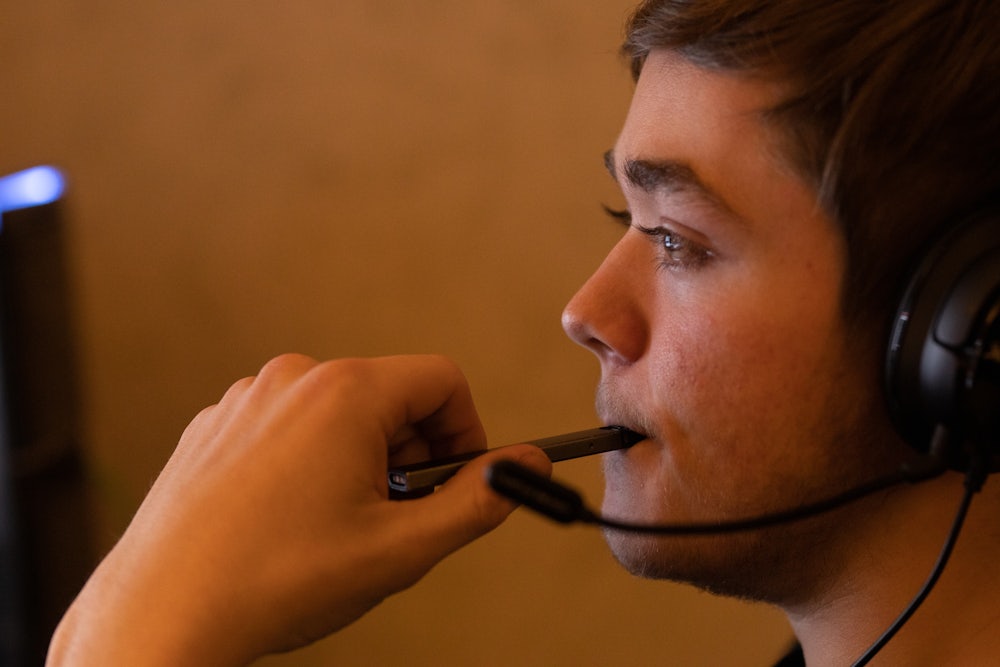“Why are there toilets in the Juul room?” read the caption of a Snapchat photo showing two urinals. I’m a senior in college, and that question made me feel old. Back in my day, cigarette smoke didn’t smell like “crème brûlée” or “cool cucumber.” I couldn’t ditch my girlfriend for Juulia. And bathrooms were reserved for scrolling through Facebook on your iPhone. But now almost 40 percent of twelfth-graders vape, and I’m the old guy asking his grandkid for help with “the Google.” When I was in high school, cigarettes weren’t cool. How has it taken longer for me to get a college degree than it has for a whole generation to get addicted to nicotine?
Last month, a House subcommittee tried to shed some light on the answer to that question. The subcommittee found that Juul “deployed a sophisticated program” to “convey its messaging directly to teenage children,” including, in one case, throwing $134,000 at a five-week summer camp for kids as young as eight. Co-founder James Monsees countered that Juul was just trying to prevent young people from using its product, noting that it had pulled the “mango” and other flavors from stores more than a year ago.
There is plenty of reason to doubt that Juul is actively trying to reduce youth vaping. If the bottom line isn’t evidence enough—Juul’s bulging profits are largely driven by younger consumers—the marketing should be. The sweet, flavored vapor delivered through a USB-charged electronic device is marketed with slick photos of young people at flashy events. Did they really think those images would only appeal to pack-a-day-smoking 55-year-olds?
A company executive said otherwise, telling The New York Times that Juul knew right away that teens were using its product. And a team of more than 80 lobbyists are working hard on Juul’s behalf to make sure that doesn’t change anytime soon.
Sure, e-cigarettes can help a lot of adults: one study found that switching every American smoker to e-cigarettes over the next decade could save 6.6 million lives. And Monsees claims that marketing Juul to kids is “antithetical to the company’s mission.”
But this debate misses the larger point. Whether or not Juul intentionally peddled its products to young people, the company needs to take responsibility for the epidemic that it created.
Take the 2010 Deepwater Horizon disaster. BP didn’t intentionally spill 4.9 million barrels of oil into the Gulf of Mexico, causing the worst environmental disaster in American history, but they did spill it all the same. Thousands protested at BP gas stations across the country. President Obama declared that “we will make BP pay for the damage their company has caused.” The government reached a record $18.7 billion settlement with BP in 2015. Additional fines, fees, and the costs of the years-long cleanup have brought the oil giant’s total outlays to $65 billion. Why not hold Juul to a similar standard?
To be fair, the day after the Food and Drug Administration demanded reams of documents as part of its investigation into Juul’s marketing to children, Juul announced that it would spend $30 million to fight youth vaping. But to be fairer, for a company valued at $38 billion, that’s a rounding error.
With that immense wealth should come real responsibility—not token remorse. Juul’s lobbying against government efforts to curb teen vaping should stop immediately. So should its youth outreach efforts. Juul should steer clear of curriculum-building, a tactic far too similar to Big Tobacco’s “prevention” programs from the 1980s and 1990s, which didn’t even mention that nicotine is addictive. Instead, it should invest money in third-party organizations like the Truth Initiative, which educates young people about the dangers of tobacco. We don’t need to see any more of Juul—or its representatives—in our middle and high schools.
Regulators and elected officials, for their part, should finally learn from decades of weak tobacco regulation. The laws that will prevent Juul and other tobacco companies from getting more kids addicted to nicotine should be put in place now, and then swiftly enforced. And just as it did after the BP oil spill, the government should hold Juul financially accountable for the damage it has already done, and it shouldn’t relent until America’s youth vaping mess has been completely cleaned up.
I texted my younger sister to ask whether people now vape in the bathrooms at our high school. I didn’t know anyone who vaped when I graduated in 2015. She texted back, “Do people your age not vape??” It’s on Juul to make sure that my sister’s generation is the last that it hooks on nicotine.
